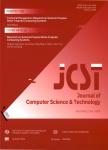Principles to Support Modular Software Construction
Principles to Support Modular Software Construction作者机构:Department of Electrical Engineering and Computer Science Massachusetts Institute of Technology Cambridge MA 02139 U.S.A.
出 版 物:《Journal of Computer Science & Technology》 (计算机科学技术学报(英文版))
年 卷 期:2017年第32卷第1期
页 面:3-10页
核心收录:
学科分类:08[工学] 0835[工学-软件工程] 081202[工学-计算机软件与理论] 0812[工学-计算机科学与技术(可授工学、理学学位)]
基 金:supported in part by the National Science Foundation (NSF) of USA under Award
主 题:program execution model data flow model codelet abstract architecture parallel computing
摘 要:The construction of large software systems is always achieved through assembly of independently written components -- program modules. For these software components to work together, they must share a common set of data types and principles for representing structured data such as arrays of values and files. This common set of tools for creating and operating on data objects is provided by the infrastructure of the computer system: the hardware, operating system and runtime code. Because the nature and properties of these tools are crucial for correct operation of software components and their inter-operation, it is essential to have a precise specification that may be used for verifying correctness of application software on one hand, and to verify correctness of system behavior on the other. We call such a specification a program execution model (PXM). It is evident that the properties of the PXM implemented by a computer system can have serious impact on the ability of application programmers to practice modular software construction. This paper discusses the concept of program execution models and presents a set of principles that a PXM must satisfy to provide a sound basis for modular software construction. Because parallel program execution on computer systems with many processing units is an essential part of contemporary computing environments, the expression of parallelism and modular software construction using components involving parallel operations is included in this treatment. The conclusion is that it is possible to build computer systems that implement a PXM within which any parallel program may be used, unmodified, as a component for building more substantial parallel programs.



